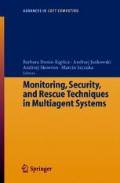Summary
The paper presents some of the issues concerning a formal description of rough sets. We require the indiscernibility relation to be a tolerance of the carrier, not an equivalence relation, as in the Pawlak’s classical approach. As a tool for formalization we use the Mizar system, which is equipped with the largest formalized library of mathematical facts. This uniform and computer-checked for correctness framework seems to present a satisfactory level of generality and may be used by other systems as well as it is easily readable for humans.
Many thanks are due to Anna Gomolińska for the motivation for this work.
Access this chapter
Tax calculation will be finalised at checkout
Purchases are for personal use only
Preview
Unable to display preview. Download preview PDF.
References
Ch. Benzmüller, M. Jamnik, M. Kerber, V. Sorge, Agent-based mathematical reasoning,Electronic Notes in Theoretical Computer Science, 23(3), 1999.
E. Bryniarski, Formal conception of rough sets, Fundamenta Informaticae, 27(2–3), 1996, pp. 109–136.
A. Gomolińska. A comparative study of some generalized rough approximations, Fundamenta Informaticae, 51(1–2), 2002, pp. 103–119.
A. Grabowski, Basic properties of rough sets and rough membership function, to appear in Formalized Mathematics, 12(1), 2004, available at http://mizar.org/JFM/Vol15/roughs_l. html.
A. Grabowski, Robbins algebras vs. Boolean algebras, in Proceedings of Mathematical Knowledge Management Conference, Linz, Austria, 2001, available at http://www.emis.de/proceedings/MKM2001/.
J. Järvinen, Approximations and rough sets based on tolerances, in: W. Ziarko, Y. Yao (eds.), Proceedings of RSCTC 2000, LNAI 2005, Springer, 2001, pp. 182–189.
R.E. Kent, Rough concept analysis: a synthesis of rough sets and formal concept analysis, Fundamenta Informaticae, 27(2–3), 1996, pp. 169–181.
The Mizar Home Page, http://mizar.org.
Z. Pawlak, Rough sets, International Journal of Information and Computer Science, 11(5), 1982, pp. 341–356.
Z. Pawlak, A. Skowron, Rough membership functions, in: R. R. Yaeger, M. Fedrizzi, and J. Kacprzyk (eds.), Advances in the Dempster-Shafer Theory of Evidence, Wiley, New York, 1994, pp. 251–271.
A. Skowron, J. Stepaniuk, Tolerance approximation spaces, Fundamenta Informaticae, 27(2–3), 1996, pp. 245–253.
F. Wiedijk, The de Bruijn factor, http://www.cs.kun. nl/∼freek/factor/.
L. Zadeh, Fuzzy sets, Information and Control, 8, 1965, pp. 338–353.
W. Ziarko, Variable precision rough sets model, Journal of Computer and System Sciences, 46(1), 1993, pp. 39–59.
Author information
Authors and Affiliations
Rights and permissions
Copyright information
© 2005 Springer-Verlag Berlin Heidelberg
About this paper
Cite this paper
Grabowski, A. (2005). On the Computer-Assisted Reasoning about Rough Sets. In: Monitoring, Security, and Rescue Techniques in Multiagent Systems. Advances in Soft Computing, vol 28. Springer, Berlin, Heidelberg. https://doi.org/10.1007/3-540-32370-8_15
Download citation
DOI: https://doi.org/10.1007/3-540-32370-8_15
Publisher Name: Springer, Berlin, Heidelberg
Print ISBN: 978-3-540-23245-2
Online ISBN: 978-3-540-32370-9
eBook Packages: EngineeringEngineering (R0)

